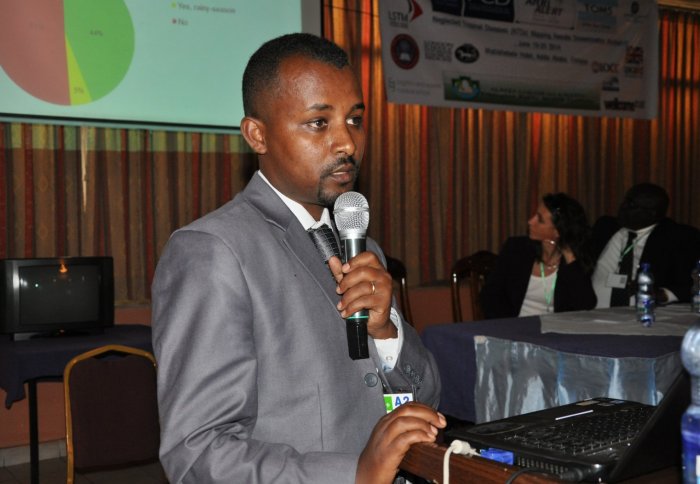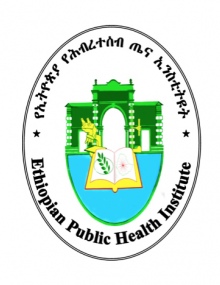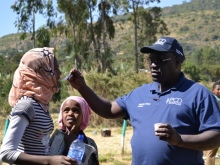New NTD data to inform large-scale deworming in Ethiopia

New data reveals 94% of 535 surveyed districts in Ethiopia are endemic for schistosomiasis and/or soil-transmitted helminths (STH).
 The Ethiopian Public Health Institute (EPHI) presented its findings to Ethiopia’s Ministry of Health, NTD experts, universities and partners at a national NTD dissemination workshop held in Addis Ababa on 19 June 2014. One important finding presented was 94% of 535 surveyed districts in Ethiopia are endemic for either schistosomiasis and/or soil-transmitted helminths (STH) – Neglected Tropical Diseases (NTDs) which are commonly found in school-children.
The Ethiopian Public Health Institute (EPHI) presented its findings to Ethiopia’s Ministry of Health, NTD experts, universities and partners at a national NTD dissemination workshop held in Addis Ababa on 19 June 2014. One important finding presented was 94% of 535 surveyed districts in Ethiopia are endemic for either schistosomiasis and/or soil-transmitted helminths (STH) – Neglected Tropical Diseases (NTDs) which are commonly found in school-children.
Working with EPHI, Imperial College London’s The Partnership for Child Development (PCD) and the Schistosomiasis Control Initiative (SCI) supported the mapping of schistosomiasis and STH prevalence and Water, Sanitation and Hygiene (WASH) infrastructure using data collected in late 2013 from 125,000 school-aged children across 2,700 schools.
The mapping exercise also showed that throughout the country only 44% of schools had a water source within the school compound and only 15% of these had water connecting to the school building.
Senior Programme Manager at SCI, Mike French commented, “The national mapping surveys, supported by Imperial College London and driven by the Government, enables areas most in need of treatment to be identified, so that cost-effective control programmes can be carried out in these at risk areas.”
To date, the surveys have been used to inform school-based deworming programmes against STH in Ethiopia’s Oromia and Amhara regions. Integrated schistosomiasis and STH campaigns will also commence in these and other regions later in the year, and eventually campaigns will extend to all areas where children are at risk.
Why Deworm School Children?
 When children are infected with parasitic worms the worms often end up being fed rather than the child, resulting in poor child nutrition, tiredness and sickness. Infected children fail to attend school on a regular basis and those who do attend school are more likely to have a poor concentration and ability to learn whilst there.
When children are infected with parasitic worms the worms often end up being fed rather than the child, resulting in poor child nutrition, tiredness and sickness. Infected children fail to attend school on a regular basis and those who do attend school are more likely to have a poor concentration and ability to learn whilst there.
Worm infections can also cause anaemia and malnutrition which further contribute to reducing children’s energy levels and learning.
School-based dewormingâ is universally recognized as a safe, simple and cost-effective solution to treating children with worms. At a cost of less than 50 US cents per child per year the benefits of school-based deworming are both immediate and enduring. Regular treatment can reduce school absenteeism by 25% and can increase adult earnings by over 20%; as a consequence of greater workforce participation when these children grow to be adults.
Adequate sanitation and access to safe water also has the potential reduce worm transmission in schools; therefore when deworming programmes are integrated with WASH interventions, child health, nutrition and education is significantly improved.
PCD and SCI Support Government Capacity
To build the capacity of EPHI staff, last month PCD, SCI, alongside partners the London School of Hygiene and Tropical Medicine facilitated a workshop where EPHI technicians were taught how to clean and analyse the data collected in 2013 and to use this to create worm prevalence and risk maps.
PCD and SCI have also been working with the EPHI since 2012 where they have been supporting the implementation of a government-led Home Grown School Feeding programme in Ethiopia’s Southern Nations and Nationalities Peoples’ Region. This comprehensive programme integrates school feeding sourced from local farmers with SHN activities including WASH and deworming.
Article text (excluding photos or graphics) © Imperial College London. Photos and graphics subject to third party copyright used with permission or © Imperial College London. School of Public HealthReporter
Mrs Alexandra Grainger
![]()